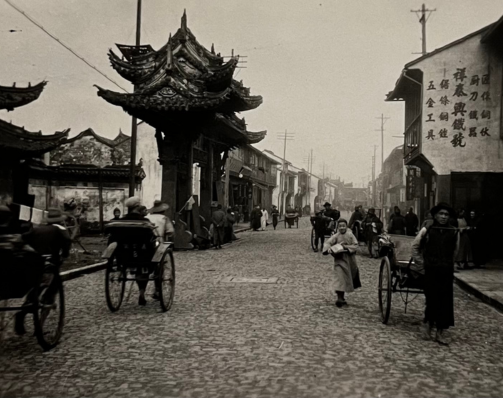
This month we recognize Asian American and Pacific Islander Heritage (AAPIH) Month.
To highlight these individuals’ contributions, history and heritage, we invite you to explore the following events, books and materials from The Claremont Colleges Library’s digital and physical collections.
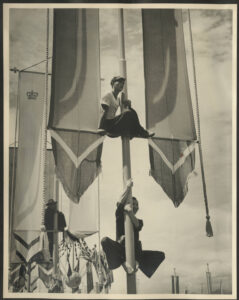
In Search of a New Home: The Yao Family’s Journey from Shanghai to Canton to Hong Kong to Claremont Exhibit – The Yao family was one of the first Chinese American families in Claremont. How many miles did they travel before they found safety and peace in their new home in Claremont? How many seas did they sail before they reached “the land of freedom”? Come and find the answer in the Asian Library’s exhibition highlighting photographic works and archival documents depicting the Yao Family’s trans-Pacific journey from China to Claremont in the 1950s. Eventually, Norman Yao served as the contracted photographer for The Claremont Colleges and Anne Lee Yao continued her career in librarianship and became the first Asian American woman librarian at The Claremont Colleges Library. The photos and documents on display at this exhibit are part of the Norman Gan-chao and Anne Lee Yao Papers, which were donated by the son and daughter of Norman and Anne — Peter Yao, CGU ’83, and Margaret Ming Yao, Pitzer ’69. Visit the finding aid to learn more about the Yao Family Papers collection. Visit the Asian Library Digital Collections on Claremont Colleges Digital Library to explore digitized photos and documents from the Yao Family Papers and other collections.
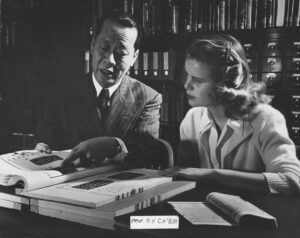
Ch’en Shou-yi Papers – Pomona College Professor Ch’en Shou-yi was known for his groundbreaking contributions to the studies of Sino-western cultural communications and exchanges. He was instrumental in initiating and expanding the Asian Studies program at The Claremont Colleges and the greater field of Asian Studies at universities on the Pacific Coast after World War II. After he passed away, his family donated his personal library and archive to our Asian Library. Valuable items can be found in the collection, such as photos and correspondence with key figures of modern Chinese intellectual history, including Hu Shih (胡适), Fu Sinian (傅斯年), Lin Yutang (林語堂) and Chiang Monlin (蔣夢麟). Explore blog postings on Prof. Ch’en by our CCEPS fellow while processing the Ch’en Shou-yi Papers.
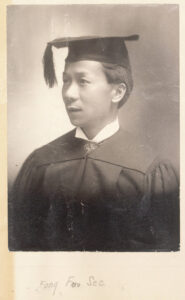
Fong Foo Sec 鄺富灼 (1869-1938) Resources – Dr. Fong was Pomona College’s first Asian student. He was born in Toishon, Guangdong (廣東臺山), China, and at age 13 made passage from Hong Kong to California. He lived with his uncle in Sacramento and during a trip to Pasadena, met Samuel Hahn and his son Edwin, who was home visiting from Pomona College. When Fong expressed his desire to receive a college education, Edwin relayed this to Pomona College President Cyrus Baldwin who urged him to come to Pomona. Fong enrolled in the Pomona College Preparatory School, working part-time and living in a small shack near campus to cover his expenses. After completing four years in the preparatory department and one year of regular collegiate enrollment from 1897 to 1902, Fong transferred to the University of California, Berkeley, where he graduated with honors in 1905. Fong then earned dual master’s degrees at Columbia University, before returning to China in 1906. In Shanghai, Fong worked for Commercial Press (商務印書館), a publishing company, and remained an active and prominent leader in religious and service organizations like the YMCA and Rotary International throughout his life. In 1922, Fong received an honorary Doctor of Law degree, which was the third awarded in the College’s history.
Japanese American World War II Incarceration Collection – This digital collection features a range of subjects central to Japanese-American life before, during and after World War II, including immigration, the California Alien Land Acts of 1913 and 1920, the War Relocation Authority (WRA), organizations supporting Japanese Americans, redress, sports, and the U.S. Army’s 442nd Regimental Combat Team. Among the archives are letters, photographs, camp publications, papers of camp administrators and counselors, certificates and other documents to prove citizenship, and school yearbooks.
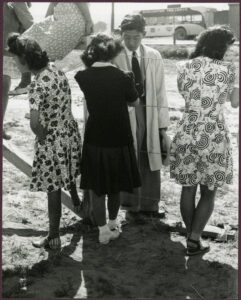
Rafu Shimpo Digital Archive – Explore the longest-running Japanese American newspaper in the United States to trace Japanese American community history in California and beyond. The Claremont Colleges Library’s subscription to the Rafu Shimpo Digital Archive contains all obtainable issues of the newspapers from 1914 on and includes an institutional subscription to rafu.com for full access to current issues.
Oriental Study Expedition Archive – This collection documents the Oriental Study Expedition undertaken by 10 students from Pomona College to spend a year in China and Japan during 1929-1930. According to the Pomona College Timeline, “Inspired partly by President Edmunds’ prior presidency of Lingnan University and his continuing interest in Asia, Sik-leong Tsui ’31, a Hawaiian student of Chinese ancestry, proposed to some fellow students a full year of travel and study in China in what would turn out, informally, to be Pomona’s first study-abroad program…The expedition created a rush of interest on campus and became an important step in the long-range development of Asian Studies as an academic field at Pomona.” The collection consists of itineraries, budgets, maps, photos, diaries and correspondence detailing the time spent in the East.
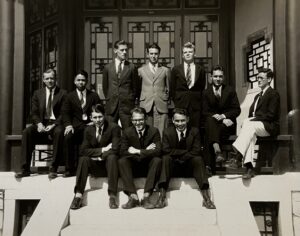
In From a Native Daughter: Colonialism and Sovereignty in Hawai’i, social activist and Hawaiian sovereignty movement leader Haunani-Kay Trask advocates for Hawaii’s liberation. Trask describes the brutal history of Hawai’i through what she referred to as its “predatory” invasion. When it appeared in 1993, the book sparked heated debates about Indigenous land, rights, sovereignty and repatriation, at once a part of and anticipating the #LandBack movement. This book is currently on display in the Archiving Social Movements exhibit.
The Pacifica Collection of Austronesian Languages contains linguistic texts, primers and dictionaries mainly from Western Indonesia, the Philippines and Polynesia. These volumes came to The Claremont Colleges Library from the personal library of Dr. Enrin Asai, a world-renowned ethnologist on the South Pacific.
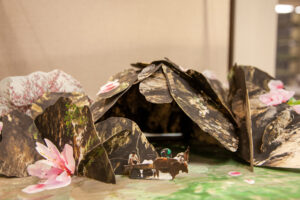
Collections of Artist Books by Asian American book artists – Available from both Special Collections at the Claremont Colleges Library and the Denison Library at Scripps College, this collection includes artists books by Asian American book artists such as Julie Chen, Irene Chan, Colette Fu, Walasse Ting, Kazumi Wilds, Kazuko Watanabe, Seiko Tachibana, Jihae Kwon, Lars Kim, Malini Grupta, Godzilla Asian American Arts Network, and the Korean American Artist Collective. Explore the bibliography and video clip on our socials (Facebook, Instagram, Twitter) of selected highlights by these artists and groups for an exhibition celebrating the AAPIH Month in 2022.
1 [cent] Life (1964) is an unbound folio from Special Collections of vibrant art and poetry by Walasse Ting (丁雄泉), supplemented by nearly thirty other contributors including Andy Warhol and Roy Lichtenstein. Ting was a Shanghai-born artist and poet who lived in Hong Kong, Paris and New York. His 61 poems in 1 [cent] Life explore his lived experience as a Chinese immigrant in the United States.
Another item from our Special Collections comes from creator Irene Chan of Ch’An Press, who describes her Asian American? Project (2007) as “business cards with text that respond to comments and questions that strangers ask Asian Americans.” She goes on to say, “Every week since age 12, I am asked one to ten of the same questions. Since these questions and comments are common to other Asian Americans as well, I created a set of business cards to flash or hand out for the appropriate moments. Through the interaction of questions and answers, lasting racial stereotypes and myths of the concept of the ‘Asian American’ are revealed.”
Resources on South-Asian Americans – Explore books, journal articles and videos documenting the South Asian Americans’ history, ethnic identity, literature, social conditions, etc. in the United States. Materials selected include both print copies and digital versions that are accessible to affiliated users of The Claremont Colleges.
In addition to the resources above, students, faculty and staff can access the Library’s databases to explore more! Please see the Asian American Studies Research Guide and the Pacific Islander Studies Research Guide.
If you are interested in examining any of these materials, we invite you to make a Special Collections Reading Room appointment. Questions can be directed to specialcollections@claremont.edu or (909) 607-3977.